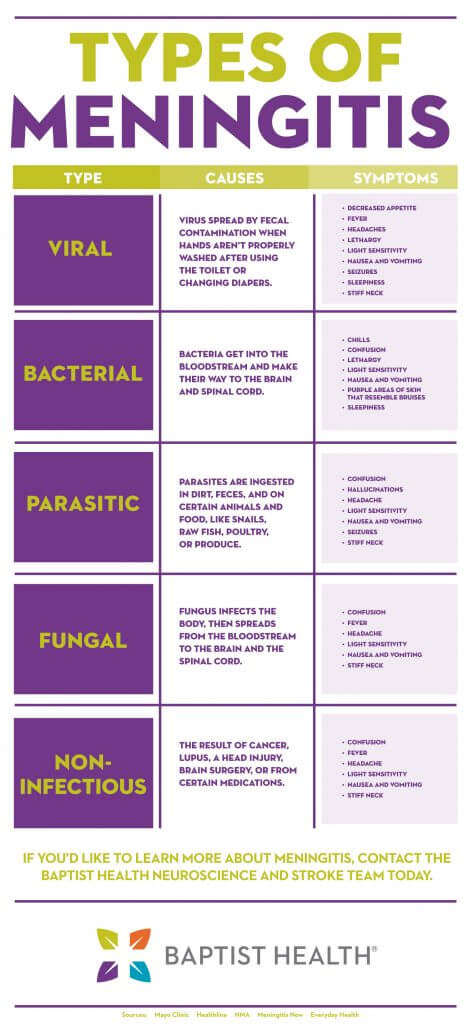Baptist Health Neurology
That Treats You Like Family
Learn More
Meningitis is an inflammation of the meninges, the three membranes that cover the brain and spinal cord. When the fluid surrounding the meninges becomes infected, meningitis can occur.
While meningitis is typically caused by a virus or bacteria, it’s also possible to get meningitis from injuries, illnesses, and certain medications. In total, there are five types of meningitis – viral, bacterial, parasitic, fungal, and non-infectious – which are detailed here:

Viral meningitis can be spread by fecal contamination when hands aren’t properly washed after using the toilet or changing diapers. To prevent viral meningitis, wash your hands frequently with soap and water, and avoid any contact with someone who has the disease. Also make sure to get vaccinated for measles, mumps, rubella, and chickenpox. Here are the symptoms that may occur in infants and adults:
Bacterial meningitis is a potentially life-threatening form of the disease that can cause brain damage, hearing loss, and ultimately death if it isn’t diagnosed and treated immediately. In most cases, bacterial meningitis occurs when bacteria get into the bloodstream and makes its way to the brain and spinal cord. The types of bacteria that can cause bacterial meningitis include Haemophilus influenzae (usually type b), Streptococcus pneumoniae, and Neisseria meningitidis. They’re usually spread person-to-person through coughing or sneezing, kissing, or mouth-to-mouth resuscitation. Some of the symptoms are similar to viral meningitis, such as stiff neck, fever, and headache, but there are other symptoms, including:
Seek immediate medical attention if you experience these symptoms. To determine whether you have bacterial or viral meningitis, your doctor will need to perform tests to see which form of meningitis you have.
This type of meningitis is less common than viral or bacterial meningitis, and it’s caused by parasites found in dirt, feces, and on certain animals and food, like snails, raw fish, poultry, or produce.
Eosinophilic meningitis (EM) is rarer than other forms of parasitic meningitis and is caused by these main parasites:
Parasitic meningitis isn’t passed person-to-person. Instead, these parasites infect an animal or are present on food that’s then eaten. If the parasites or parasite eggs are infectious when they’re ingested, infection can occur.
One extremely rare type of parasitic meningitis, amebic meningitis, is a life-threatening type of infection and is caused when one of several types of ameba enters the nose when you’re swimming in lakes, rivers, or ponds. The parasite can destroy brain tissue and may cause hallucinations, seizures, and other serious symptoms.
Fungal meningitis is rare and is caused by a fungus that infects your body, then spreads from your bloodstream to your brain and spinal cord. People with weakened immune systems due to diseases such as HIV or cancer are more likely to develop fungal meningitis.
Fungal meningitis is usually caused by inhaling fungal spores from contaminated soil or from bird or bat droppings. It’s treated by long courses of high-dose antifungal drugs, usually administered through an IV.
Non-infectious meningitis can’t be caught from another person and typically occurs as the result of cancer, lupus, a head injury, brain surgery, or from certain medications. Symptoms are typical of meningitis in general and include:
Viral meningitis is more common than bacterial meningitis, and usually less severe. The majority of cases of viral meningitis are caused by enteroviruses, but it’s also possible to contract it from other common viruses such as chickenpox, mumps, and measles. Many of the symptoms of viral meningitis are similar to bacterial meningitis, which include sudden fever, stiff neck, and headache, but it differs in that bacteria won’t grow in the cerebrospinal fluid.
If you’d like to learn more about meningitis, contact the Baptist Health Neuroscience and Stroke team today. If this is an emergency, please dial 911.